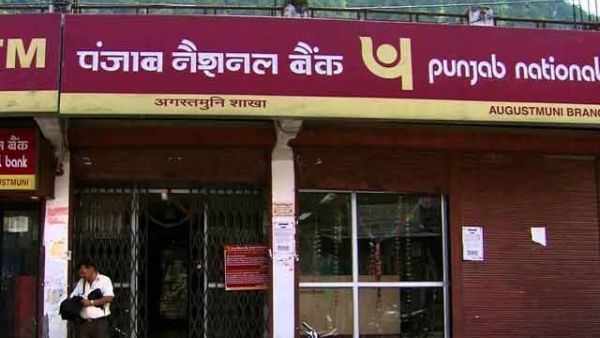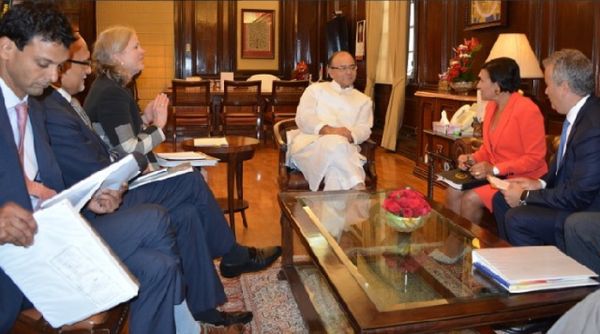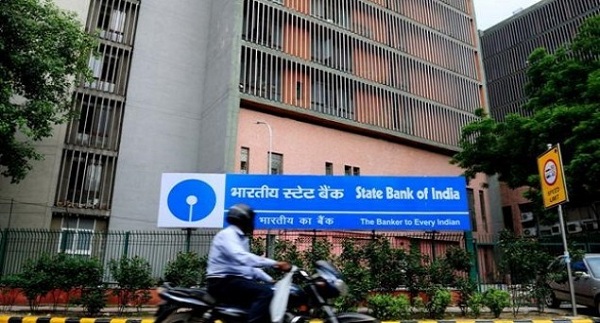
by admin | May 25, 2021 | Banking, Corporate, Corporate Governance, News

Piyush Goyal
Mumbai : Public sector banks (PSBs) will soon create a dedicated mechanism for managing stressed accounts, Finance Minister Piyush Goyal said on Friday following a meeting with PSB chiefs on the issue of banks’ non-performing assets (NPAs), or bad loans.
The accumulated NPAs in the Indian banking system have crossed the staggering level of Rs 9 lakh crore. The proposed mechanism would seek a faster resolution of such cases.
“A panel under Punjab National Bank (PNB) non-executive chairman Sunil Mehta will give its report in two weeks over setting up of Asset Restructuring Company (ARC) or Asset Management Company (AMC) to resolve stressed assets,” Goyal told reporters here after the meeting.
“I have discussed improving credit flow to strengthen Indian economy while mitigating risk flow associated with that,” he said.
“The committee will deliberate whether it is worth considering setting up of an AMC to deal with assets having exposure to several banks. It will also consider if setting up of an ARC or AMC is good for the banking system.”
Noting that the State Bank of India has a “proven mechanism” to take faster decisions in a transparent manner, Goyal, who holds temporary charge of the finance portfolio in the absence of a convalescing Arun Jaitley, said all bank showed willingness to set up such a mechanism for faster resolution of stressed accounts.
“Some of the banks may also consider setting up oversight committees and bring in external expertise to help faster decision making,” he said.
Goyal said discussions during the meeting focused on credit flow and banks devising mechanisms to ensure credit flow to good borrowers should not be hampered owing to restrictions on credit activity due to NPAs.
“Risks need to be mitigated to support the economy,” he said.
The Minister said the meeting had discussed situation arising out of banks working in “silos” and PSBs “decided to come together in a cohesive manner to resolve the credit needs of MSMEs (micro, small, medium enterprises), exporters, small and medium borrowers so that the needs of the economy can be addressed.”
He also said that all vacant positions of PSB heads will be filled in the next 30 days.
—IANS

by admin | May 25, 2021 | Banking, Corporate, Corporate Buzz, News, Politics
 New Delhi : In light of the massive Rs 11,300 crore ($1.8 billion) scam allegedly involving jeweller Nirav Modi that has hit state-run Punjab National Bank (PNB), industry chamber Assocham said on Sunday that the government should surrender its majority control of banks, which should be allowed to function like private sector lenders.
New Delhi : In light of the massive Rs 11,300 crore ($1.8 billion) scam allegedly involving jeweller Nirav Modi that has hit state-run Punjab National Bank (PNB), industry chamber Assocham said on Sunday that the government should surrender its majority control of banks, which should be allowed to function like private sector lenders.
In a regulatory filing earlier this week, PNB said it had detected the gigantic fraud in one of its Mumbai branches, putting the quantum of fraudulent transactions at $1,771.69 million. The amount is equivalent to eight times the bank’s net income of about Rs 1,320 crore ($206 million).
“The PNB’s fraudulent transactions worth Rs 11,300 crore should act as a strong trigger for the government for reducing its stake to less than 50 per cent in the banks which should then be allowed to work on the lines of private sector lenders with a full sense of accountability to their shareholders protecting interest of depositors,” Assocham said in a statement here.
“The public sector banks (PSBs), ironically, are slipping from one crisis to the other and there is a limit the government can keep bailing them out at the cost of taxpayers’ money, even if it is the principal shareholder in these lenders,” it said.
The industry body said PSB senior managements spend bulk of their time “receiving and implementing directions from the bureaucrats even for innocuous issues.”
“In the process, the core banking functions, including all important risk mitigation and management, take a back seat.”
“The problem has become more grave with banks adopting new technologies which can prove both boon and bane,” it added.
In this connection, a Special CBI Court in Mumbai on Saturday remanded to police custody till March 3 three accused persons in the case.
The three includes a retired PNB Deputy Manager Gokulnath Shetty, Single Window Operator Manoj Kharat and an authorised signatory of the prime accused Nirav Modi’s group companies.
Besides these, the Central Bureau of Investigation (CBI) has named 10 other directors and officials as accused in the scam.
“Once the government equity in the banks is reduced below 50 per cent, there would be much more autonomy along with accountability and responsibility of the senior management,” Assocham said.
“The boards should then be truly taking the policy decisions while the CEOs would run the banks with full authority, coupled with the commensurate responsibility, instead of looking towards the bureaucrats for directions,” it added.
Assocham Secretary General D.S. Rawat in a statement urged the Reserve Bank of India (RBI) to take the lead to “engage with the industry in finding ways to do clean business in the entire financial sector, be it the public sector or private sector banks or even the non-banking finance companies.”
In this regard, Chief Economic Advisor (CEA) Arvind Subramaniam has also advocated more private participation in public sector banks.
Speaking at an event in Chennai on Saturday, Subramaniam said while the government was going for recapitalisation of public sector banks, the scrutiny, monitoring and disciplined deployment must be ensured only through greater private participation in banks.
According to him, there should be less public lending to private sector and the mode to achieve that is to have higher private participation in the banking sector.
He said more privatisation could be the way forward since there was no guarantee that better governance recommendations of banks, instead of privatisation, would be implemented effectively.
—IANS

by admin | May 25, 2021 | Corporate, Corporate finance, Corporate Governance

Arun Jaitley
New Delhi : Finance Minister Arun Jaitley on Saturday said the government’s move to recapitalise public sector banks (PSB) would improve their lending capacity.
“I think the indications are that it’s (credit offtake) already happening and that seems to be good sign and now with the recapitalisation of the banks, the capacity itself to lend will improve,” Jaitley told reporters.
He was addressing a press meet along with Reserve Bank of India Governor Urjit Patel.
The government’s plans to spend Rs 2.11 lakh crore to recapitalise PSBs in a major step to restore the banking system’s health.
“I had a meeting with the SEBI’s (Securities and Exchange Board of India) board, and one of the factors that stood out in their presentation was that there is now also increased reliance on the bonds market as far as credit is concerned,” the finance minister said.
Jaitley had a meeting with RBI and SEBI boards in the national capital on Saturday on the Union Budget.
Talking about the fiscal situation in the country, Jaitley said next year would be reasonably more comfortable as far as revenues are concerned.
“Therefore, I can’t at this stage say that there would be any slippage. I am sure we will able to maintain the target quite well… You can’t base it on a hypothetical situation like oil prices… What has happened in the last three days is again something which nobody had predicted. So, that’s… entering into an area on which there is no certainty at the moment.,” he added.
Brent crude oil price is hovering around $63 per barrel at present.
Adding to the oil price concern, Patel said: “If I can just add that, in fact, in the MPC (Monetary Policy Committee) resolution, we had put forth the downside risks or the mitigating factors. We had observed, that in recent days, oil prices had two-way movement… What the Finance Minister said is exactly the correct point that, we need to be prepared for movements either way.”
“It is just very difficult to predict oil prices. A few months ago… June or so, people were talking about oil prices never going above $40-45… and some of the advice that came to the MPC and RBI was based on that which turned out to be wrong in a major way,” Patel said.
—IANS

by admin | May 25, 2021 | Banking, Corporate, Corporate finance, Corporate Governance, Economy, Finance, Markets, News, Politics
 New Delhi : The central government’s recent decision to recapitalise public sector banks (PSBs) has led to a surge in credit growth, the government said on Saturday.
New Delhi : The central government’s recent decision to recapitalise public sector banks (PSBs) has led to a surge in credit growth, the government said on Saturday.
Finance Minister Arun Jaitley said that credit growth would go further up once the infusion of capital takes place into the baking system.
According to Financial Services Secretary Rajeev Kumar, the banking sector posted double digit growth on a year-on-year basis in December 2017.
“Surge in credit growth: Sustained momentum post-PSB recap decision — Banking sector posts double digit (10.7 per cent Y-o-Y) growth in Dec’17, up from (7.2 per cent Y-o-Y) in Oct’17, powered by services and retail,” Kumar tweeted.
Later in the day, Jaitley said the lending that the banks do is an indication of how growth will move.
“The latest data has shown that credit growth has moved up. And once the infusion of capital takes place into the banking system, credit growth will further go up,” he said during 75th anniversary celebrations of the UCO Bank.
—IANS

by admin | May 25, 2021 | Corporate, Corporate Governance
 New Delhi:(IANS) Taking the first step towards a holding company structure for public sector banks (PSBs), the government on Friday announced the setting up of a Banks Board Bureau (BBB).
New Delhi:(IANS) Taking the first step towards a holding company structure for public sector banks (PSBs), the government on Friday announced the setting up of a Banks Board Bureau (BBB).
It will recommend appointment of directors in PSBs and advise on ways of raising funds and dealing with issues of stressed assets.
“As a first step towards a bank holding company that will hold all government investments in public sector banks, we had proposed a Bank Board Bureau and its structure will be announced,” Finance Minister Arun Jaitley said at a press conference here.
“In the last few years, the public sector banks have faced challenging situation, partly on account of slowdown in some sectors. “To resolve the current problem, you need to deal with the banks as well as the sectors themselves,” he said.
“Political interference in the functioning of banks must cease. Commercial decisions should be taken on commercial considerations,” the finance minister added.
Jaitley said the new policy – Comprehensive Transformation Framework – being announced for banks is one “where each bank will be monitored now on key performance parameters”.
Financial services secretary Hasmukh Adhia said the BBB would replace the existing appointments board for PSBs.
“The BBB will also be a link between the government and banks and will be engaged with banks to evolve strategies for them,” he said.
The bureau will be a six-member board comprising three from the private sector and three government nominees, while the chairman “will be a distinguished banker or regulator”, Adhia said.
Jaitley in his budget speech in February had announced the setting up of an autonomous Banks Board Bureau for helping lenders raise capital for meeting expansion needs.
Banks have a requirement for Rs.180,000 crore over the next four years to meet their capital requirements, Adhia said.
“Of this, we will provide Rs.70,000 crore. They can raise Rs.1.1 lakh crore from the market,” the secretary said.
Last month, the government presented to parliament a supplementary demand for grants to provide for Rs.12,000 crore towards recapitalization of PSBs.
Adhia said the government plans to provide Rs.25,000 crore capital each in the current and next fiscal year, while Rs.20,000 crore would be provided during 2017-18 and 2018-19.
The Rs.25,000 crore this year will be provided in three tranches.
Around 40 percent of the amount will be given to those banks which require support, and all PSBs will be brought to the level of at least 7.5 percent core capital by fiscal 2016.
In the second tranche, 40 percent of capital will be allocated to State Bank of India, Bank of Baroda, Bank of India, Punjab National Bank, Canara Bank and IDBI Bank.
The remaining portion of 20 percent will be allocated to the banks based on their performance during the three quarters in the current year.
Jaitley has allocated Rs.7,940 crore in the budget for recapitalisation of public sector banks in this fiscal.
The union cabinet had in December allowed state-run banks to raise up to Rs.160,000 crore from the capital markets by diluting the government stake in phases to 52 percent.
As per an estimate, public sector banks would need additional capital of up to Rs.240,000 crore by 2018 to meet the Basel III capital adequacy norms, put in place to guard against a repeat of the situation following the 2008 US financial crisis.
The Reserve Bank of India said last month that state-run banks are adequately capitalised, but would need additional funds to comply with international capital adequacy norms in the future.





